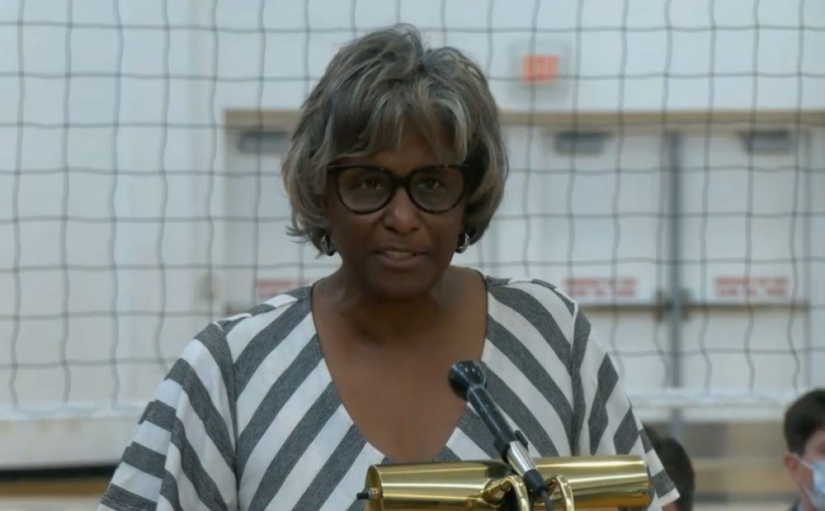- Details
- Category: Senator Adriane Johnson News
 LINCOLNSHIRE – Small businesses provide a space for people to come together and support their communities, inspiring State Senator Adriane Johnson (D-Buffalo Grove) to host the August edition of her monthly Coffee & Connect outreach event at a locally owned Italian eatery.
LINCOLNSHIRE – Small businesses provide a space for people to come together and support their communities, inspiring State Senator Adriane Johnson (D-Buffalo Grove) to host the August edition of her monthly Coffee & Connect outreach event at a locally owned Italian eatery.
The event will take place Saturday, Aug. 28 from 10:30-11:30 a.m. at Bontà Pizzeria & Restaurant, located at 430 Milwaukee Ave. in Lincolnshire.
“During a time when so many businesses are struggling, I want to put a spotlight on the shops and restaurants that make the 30th District so vibrant,” Johnson said. “That’s why I chose to host Coffee & Connect at Bontà Pizzeria this month.”
Read more: Local mom-and-pop pizzeria to host Johnson’s Coffee & Connect
- Details
- Category: Senator Adriane Johnson News
 BUFFALO GROVE – After months of hard work and two successful community events, the members of State Senator Adriane Johnson’s (D-Buffalo Grove) 2021 Youth Leadership Advisory Panel are heading back to school armed with new skills and experience in community service.
BUFFALO GROVE – After months of hard work and two successful community events, the members of State Senator Adriane Johnson’s (D-Buffalo Grove) 2021 Youth Leadership Advisory Panel are heading back to school armed with new skills and experience in community service.
“I’m proud to see how much the students on my 2021 Youth Leadership Advisory Panel have grown in the short time they’ve been working with my office,” Johnson said. “I hope this experience has empowered them to continue their activism and even pursue careers in public service.”
In June, Johnson selected six local high school and college students to participate on the 2021 Youth Leadership Advisory Panel, which worked alongside Johnson’s district office staff for nine weeks to help put together youth-centered community events and amplify young voices in the Lake County area.
The panel successfully executed two events this summer, including a community cleanup day in Foss Park, which drew over 50 participants, and a Gun Violence Prevention Roundtable featuring input from religious and community leaders.
The panelists include:
- Maddie Wang – Rising junior, Adlai E. Stevenson High School
- Ellie Baden – Rising junior, Michigan State University
- Jason Mascarenhas – Rising sophomore, Adlai E. Stevenson High School
- Maeve Griffin – Rising sophomore, University of Wisconsin-Madison
- Eliana Bernat – Rising senior, Vernon Hills High School
- Francys Munoz – Rising sophomore, Northeastern Illinois University
Wang, Baden and Mascarenhas served as co-chairs of the panel.
“The 30th District team benefited greatly from the creativity and innovation our panelists brought to the table,” Johnson said. “After working with such brilliant and talented young people, I have even stronger hope for our community’s future.”
Johnson plans to continue the Youth Leadership Advisory Panel program in 2022. The application period will be announced next spring on her website: www.SenatorAdrianeJohnson.com.
PHOTO: State Senator Adriane Johnson (D-Buffalo Grove) celebrated with her 2021 Youth Leadership Advisory Panel following the Gun Violence Awareness Roundtable the panel helped plan on Aug. 10. From left to right: Ellie Baden, Maddie Wang, Senator Johnson, Jason Mascarenhas and Maeve Griffin. Not pictured: Eliana Bernat and Francys Munoz.
- Details
- Category: Senator Karina Villa News
 ST. CHARLES – The City of St. Charles will receive over $8,000 in grant funding for historic preservation projects through the National Park Service’s Historic Preservation Fund, State Senator Karina Villa (D-West Chicago) announced Wednesday.
ST. CHARLES – The City of St. Charles will receive over $8,000 in grant funding for historic preservation projects through the National Park Service’s Historic Preservation Fund, State Senator Karina Villa (D-West Chicago) announced Wednesday.
“Families in the 25th District have long been able to enjoy the rich history throughout the district, especially in St. Charles,” Villa said. “I’m eager to see the results of the architectural survey, and I hope we can add another historic district to our community.”
More than $131,400 in Certified Local Government grants will be distributed throughout Illinois for nine historic preservation projects that focus on surveys, public education, planning and nominations to the National Register of Historic Places.
St. Charles was awarded $8,262 in Federal Historic Preservation Funds, and the City of St. Charles will match $3,057 of that funding to conduct an intensive architectural survey in the Pottawatomie Neighborhood. The survey will identify and document the history and character of structures in the neighborhood for the potential establishment of a fourth historic district in the community.
Information on how to apply for the next round of Certified Local Government grants can be found here.
- Details
- Category: Senator Scott Bennett News
 DANVILLE – State Senator Scott Bennett (D-Champaign) is encouraging veterans and other job seekers to apply for the Illinois Department of Transportation’s seasonal snow-and-ice removal positions to keep streets clean during the winter months.
DANVILLE – State Senator Scott Bennett (D-Champaign) is encouraging veterans and other job seekers to apply for the Illinois Department of Transportation’s seasonal snow-and-ice removal positions to keep streets clean during the winter months.
“Winter maintenance crews are essential in keeping traffic moving and making sure people get to their destinations safely, whether that be commuting to work or traveling home for the holidays,” Bennett said. “This is a great opportunity for folks seeking employment during these challenging times, and it’s an especially excellent way for veterans to get their foot in the door.”
Through the department’s annual “snowbird” program, temporary snowplow drivers are hired every year on a full-time and on-call basis. To be considered, applicants must have a commercial driver’s license. A pre-employment physical, vision test, and drug and alcohol screening are also required.
Applicants will be selected based on availability, job-related experience and qualifications. Veterans are strongly encouraged to apply.
Interested candidates can find additional information, including details on the application process, pay and the potential for benefits, here. Job postings will be made available the week of Aug. 23.
- Details
- Category: Senator Doris Turner News

SPRINGFIELD – Agricultural sciences will now be added as a type of course that may be counted towards the requirement for three years of sciences in order to gain admission to an Illinois public university under a plan backed by State Senator Doris Turner’s (D-Springfield).
“This is simply an effort to highlight the importance of agricultural science,” said Turner. “It is my hope that students are encouraged to work and study in the field now that we’ve expanded our current curricula to include specialized sciences.”
Read more: Illinois to expand agricultural education for students
- Details
- Category: Senator Dave Koehler News
 SPRINGFIELD – Penicillium rubens, a strain of penicillium discovered in Peoria, will officially be Illinois’ state microbe thanks to legislation sponsored by State Senator Dave Koehler (D-Peoria), signed into law Tuesday.
SPRINGFIELD – Penicillium rubens, a strain of penicillium discovered in Peoria, will officially be Illinois’ state microbe thanks to legislation sponsored by State Senator Dave Koehler (D-Peoria), signed into law Tuesday.
“The discovery of penicillium rubens in Peoria saved countless lives during World War II, and has saved many since,” Koehler said. “By making it our official microbe, we ensure that the story of P. rubens will be intertwined in our state history for generations to come.”
Read more: Koehler’s new law designates bacteria discovered in Peoria as state microbe
- Details
- Category: Senator Tom Cullerton News
 SPRINGFIELD –State Senator Tom Cullerton (D- Villa Park) spearheaded a measure that was signed on Monday to help connect residents of long-term care facilities to loved ones during disasters like the COVID-19 pandemic.
SPRINGFIELD –State Senator Tom Cullerton (D- Villa Park) spearheaded a measure that was signed on Monday to help connect residents of long-term care facilities to loved ones during disasters like the COVID-19 pandemic.
“We’ve learned from this pandemic how social isolation can have such a negative effect on mental health, especially for older adults in our state,” Cullerton said. “It’s so important that if anything like this pandemic happens again, long-term care facilities have a plan of action to make sure their residents have the opportunity to call their loved ones frequently.”
Read more: Cullerton celebrates signing of legislation to help long-term care facility residents
- Details
- Category: Senator Karina Villa News
 SPRINGFIELD – Schools will have to follow specific trauma-informed guidelines for school shooting lockdown drills under State Senator Karina Villa’s (D-West Chicago) new law.
SPRINGFIELD – Schools will have to follow specific trauma-informed guidelines for school shooting lockdown drills under State Senator Karina Villa’s (D-West Chicago) new law.
“We should be doing everything in our power to stop school shootings and avoid the trauma that comes from shooting events — including that caused by involvement in graphic simulations during lockdown drills,” Villa said. “Our students should feel safe at school, and these trauma-informed guidelines will help them prepare for the worst without carrying the weight of a simulated tragedy.”
Read more: Villa law mandates trauma-informed school shooting lockdown drills
More Articles …
- Castro celebrates signing of legislation to empower immigrant victims of crime to report
- Illinois residents can seek mental health care in Wisconsin under new Johnson law
- Murphy laws improve financial transparency, living conditions for residents of mobile home parks
- Former State Senator William Haine has died
Page 422 of 768













 © 2026 Illinois Senate Democratic Caucus
© 2026 Illinois Senate Democratic Caucus